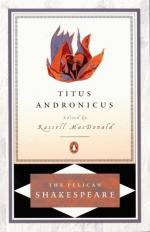|
This section contains 7,194 words (approx. 24 pages at 300 words per page) |

|
SOURCE: "Titus Andronicus: The Form of Shakespearian Tragedy," in Shakespeare Quarterly, Vol. XIV, No. 3, Summer, 1963, pp. 201-13.
In the following essay, Hamilton examines Ovidian influences on Titus Andronicus, and calls the play the archetype of Shakespeare's later tragedies.
In this essay I shall challenge the usual reading of the play as expressed in Dover Wilson's judgment that it is "some broken-down cart, laden with bleeding corpses", and in T. S. Eliot's remark that it is "one of the stupidest and most uninspired plays ever written."1 One word may sum up the reasons for rejecting this play: excess. Its plot tells
of murthers, rapes, and massacres,
Acts of black night, abominable deeds,
Complots of mischief, treason, villainies,
Ruthful to hear, yet piteously perform'd.
(V.i.63-66)2
The S. D. "Enter . . . Lavinia, her hands cut off, and her tongue cut out, and ravish'd" displays this excessive violence through its deliberate...
|
This section contains 7,194 words (approx. 24 pages at 300 words per page) |

|


